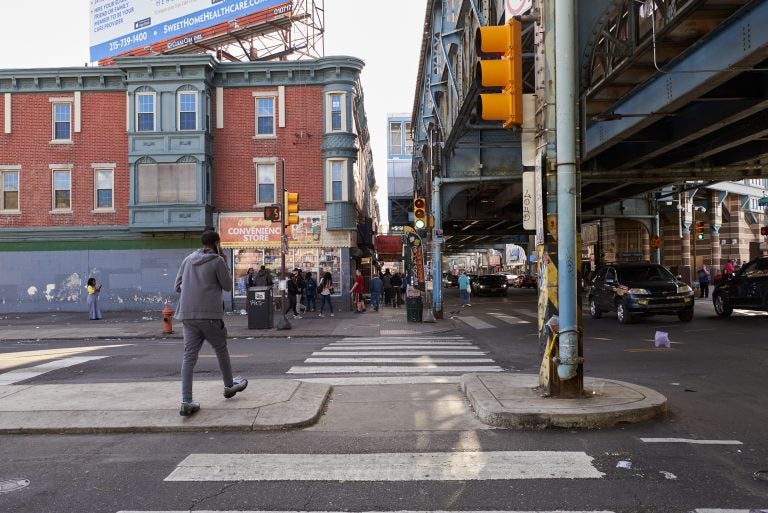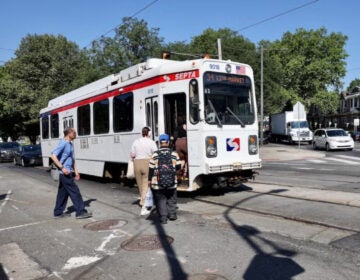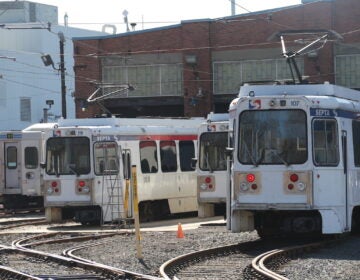SEPTA responds to Kensington concerns with more repairs and community collaboration
On April 23 at 8 p.m. SEPTA will shut down the elevators at the station for repairs. No date has been set on when they’ll reopen yet.

Outside Allegheny Station in the Kensington section of Philadelphia. (Natalie Piserchio for NPR)
SEPTA will close Allegheny Station for overnight repairs for three nights starting Friday, April 23. The closures, lasting from 8 p.m. to 5 a.m., are for deep cleaning and maintenance work.
“We know that it is an inconvenience and we will impact some people and some people’s work schedules as well,” said SEPTA general manager Leslie Richards. She said the choice to do it over the weekend was to “impact the least number of people during the work schedule.”
Also, on April 23 at 8 p.m. SEPTA will shut down the elevators at the station for repairs. No date has been set on when they’ll reopen yet.
The closure would occur weeks after SEPTA reopened Somerset Station after temporarily closing the stop to fix elevators at the station after urine and needles led to severe damage. SEPTA also made a number of upgrades at the station including a deep clean, new paint, new light fixtures, and repairs to stairs.
As work wound down at Somerset, SEPTA began a similar effort at Allegheny. This time the station would remain operational.
Along with the improvement efforts comes a new plan to keep the station safe and clean. SEPTA plans to bring in an elevator attendant to prevent them from falling into disrepair again. The authority also built a police booth at Somerset for SEPTA police officers stationed at the stop.
Riders can also expect to see at least one security guard at the station. SEPTA recently contracted with AlliedBarton for 60 security guards to be stationed along the Market-Frankford Line between 15th Street and Frankford Transportation Center. The guards began their duties this week.
The 60 guards are part of a 90-day pilot program to address increased safety concerns on the system. SEPTA officials plan to use the pilot to fine-tune their needs for additional security before officially contracting a security firm, one they hope is local and “minority-owned,” for a longer term.
“We’re going to take a look at that and see what kind of effect that has on the system safety,” said Chief Thomas Nestel.
Social services will also come into play to ensure SEPTA is not simply shifting people struggling with homelessness and drug addiction from one place to another.
Ken Divers, SEPTA’s assistant director of transportation, leads SEPTA’s new vulnerable population program, which oversees the authority’s effort to address homelessness and addiction on the system.
Divers boasted that workers on the ground at Somerset made contact with 65 people within a few days. Of that number, two have been taken off the street to receive services.
He said SEPTA is looking to extend the effort to Huntingdon and Allegheny stations, while also “trying to see how we can collaborate with the local officials, with the city officials, with the outreach agencies to see how we can mimic this on a much broader scale.”
“This is a wonderful springboard into solving our vulnerable [population] crisis that we find ourselves in today,” Divers said.
Paid work opportunities may come to the Kensington neighborhood, as well. SEPTA general manager Leslie Richards explained the authority is looking for “community participation for positions such as elevator attendants [and] platform attendants to help us maintain these areas.”
Authority officials have to be careful not to violate SEPTA’s union contract, said Richards.
“We’re talking to several firms right now that have this type of structure,” Richards said. “But we’re not far enough along to share the names of those firms yet.”
The detailed plan came after community members, outraged by the short notice of the closure, demanded transparency and participation in the process of reopening Somerset. Authority officials, including Richards, have been meeting with community members regularly for ongoing updates.
At a meeting on Wednesday, Shannon Farrell of Harrowgate Civic Association offered a word of advice to SEPTA when dealing with city officials who may be unwilling to commit the effort.
“We’ve done this and you just can’t just accept no, because we’re going to lay it on you,” Farrell said. “When there’s a problem with the station, you’re responsible for it. So you can’t accept the city’s bulls–t answers that they’ve been giving for four years.”
 WHYY is one of over 20 news organizations producing Broke in Philly, a collaborative reporting project on solutions to poverty and the city’s push towards economic justice. Follow us at @BrokeInPhilly.
WHYY is one of over 20 news organizations producing Broke in Philly, a collaborative reporting project on solutions to poverty and the city’s push towards economic justice. Follow us at @BrokeInPhilly.

Subscribe to PlanPhilly
WHYY is your source for fact-based, in-depth journalism and information. As a nonprofit organization, we rely on financial support from readers like you. Please give today.









